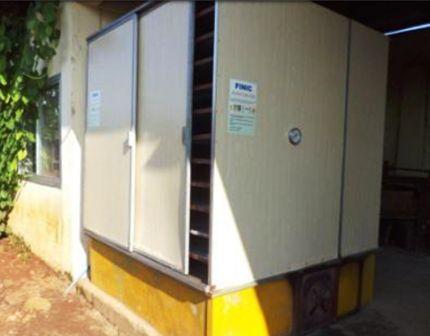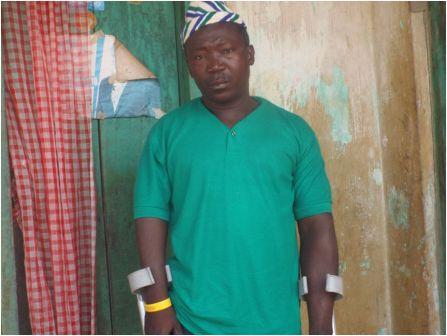FINIC’S technological success – The invention of a food dryer in Sierra Leone
A dilemma that befalls farmers and processors in many parts of the world is that some of their need for drying produce coincides with the start of the rainy season. This is the case as much in Sierra Leone as in all countries of Africa. This dilemma precipitates the problems of post-harvest losses and lowers value addition strife which is key to a country’s productivity enhancement. A cost effective Dehydration Technology that can accommodate those that are in the lowest part of the poverty pyramid is therefore imperative, not only for Sierra Leone, but also other countries of the world requiring such appropriate technology. This is what the Fomel Industry & National Industrialization Centre (FINIC) has achieved recently.
About 2 years ago, the passion for mechanical things merged with the desire to boost value addition to our home grown produce, propelled the Managing Director of FINIC– Mr. Foday Melvin Kamara – to jolt his team of technicians to research into a food dehydrator that will dehydrate a wide range of agricultural produce including cacao, cassava chips, cassava flour, ginger, onions, mango chips, pepper, rice flour etc. He provided the required leadership and guidance and the result is a positive news for Africa in general, and Sierra Leone specifically, for which all Sierra Leoneans should be proud of.
The equipment uses biomass (wood, agricultural waste, cacao pods, cassava peel etc.) as fuel to generate the heat required. The scientific knowhow to distribute the heat relatively evenly in the drying cabinet is where FINIC has got an edge. Technologies have been developed before in industrialized countries but such technologies are electricity dependent which make them not only costly and expensive to operate but also very environmentally unfriendly. Climate change and its effects on our agricultural productivity is precipitated by the release of un-recycled carbon dioxide when fossil fuel is burnt. This should prompt industrialists, scientists and manufacturers alike to take responsibility in the development of technologies that are not only safe but also that are energy efficient. With this dryer, it is what FINIC has glaringly accomplished.
The dryer FINIC developed is not only energy efficient as it has a high thermal efficiency (the ability of the equipment to make use of most part of the heat to dry the produce), but also it uses renewable and carbon neutral resource – wood. Wood as fuel is renewable in the sense that it can be grown to replace harvested ones whilst its carbon neutrality deals with the fact that when wood is burnt, it releases carbon dioxide into the atmosphere to be reabsorbed and stored by new growing trees.
The equipment is solid state (no moving parts), biomass powered and has no steam components which makes it very safe and perfect for rural operations. The dryer/dehydrator has a height of 7 feet (2.1 meters), width of 6 feet (1.8 meters) and a length of 6 feet (1.8 meters). It has space to house a total of 88 drying trays making a total surface area of 60 square meters which is more than the drying surface of a village drying floor and enough to hold 400kg (8 bags) of cassava flour/chips in one batch. This notable attribute removes the hassling task of having to load and unload several times in a day. Another parameter is the high temperature attainment with the equipment. The team at FINIC recorded a temperature reading as high as 100 degrees Celsius without load and 75 degrees Celsius when fully loaded and at a given time frame.
The dryer does not need complicated panel work but can rather be built using mud bricks. The technology for the distribution of the heat in the drying cabinet and the drying trays are prefabricated by FINIC and taken for installation to any part of the country.
The Food Processing Department of FINIC is now fully utilizing the dryer to produce rice flour and papp (rice powder bumped for cooking and mostly eaten during the Ramadan period) for sale to the general public. This business has shown an early positive signal that it will be booming as the difficulty faced by women to prepare rice into flour and other food stuff requiring rice to be powdered has been alleviated.
Other food products using our home grown cacao are being developed by FINIC and will soon hit the market. This is made possible by the dryer and other processing equipment manufactured by FINIC. The hammer mill, the rice de-stoner, the rice papp balling machine and the blender are making the production of rice flour, FINIC currently undertakes a high scale possibility.
Added to the manufacturing component, the team at FINIC also rides high in skills development and training. Each year, FINIC enrolls 30 persons for a three year training programme in Industrial Mechanics which is a course designed to impart skills in the design and construction of machine systems, jigs, and welding operations. The Managing Director, Mr. Foday Melvin Kamara, firmly believes that to be very rich in a very poor community without doing something about it will not be in the interest of anybody. In the same vein, he believes, it will not pay us good to be dishing out monies to young people as it can only help them in a flash temporality. Giving them education and skills is what guarantees them a means of livelihood.
Sierra Leone stands tall in countries of the sub region for the design and construction of agro processing equipment engineered by FINIC. From its establishment in 1997 to date, FINIC has recorded several successes in the design and construction of agro processing machines including the design and construction of a coin activated mechanical condom vending machine. In 2010, the Managing Director of FINIC, Mr. Foday Melvin Kamara won a national competition for the design of energy efficient systems organized by the Sierra Leone Chamber of Commerce which further led him to participate in an international competition organized by ECOWAS in Ivory Coast and earned him a certificate issued and signed by the then President of ECOWAS. The system he designed and constructed for the competition uses engine waste heat to dry 2 tons of palm kernels in 4 hours. The waste heat was sourced from a 225 KVA generator which provides power for a palm kernel oil extraction machine at the FINIC’S Biodiesel production facility at Masumana village, in the Koya Chiefdom. In the same year, FINIC filed for a patent of the system which he upgraded to heating biodiesel reactors for the purpose of biodiesel production and also for use in cars for the purpose of heating water for tea or coffee drinking while driving a long trek in cold weather conditions. The filing was made through an American Invention organization that evaluated the device and gave it 85% score mark for purpose suitability and marketability.
It will be recalled that in 2011, Mr. Foday Melvin Kamara – was conferred the Honour by His Excellency, the President Dr. Earnest Bai Koroma for exemplary entrepreneurship and engineering.
Also very recently, as recent as in September of this year, the hardworking and innovative Minister of Agriculture, Forestry and Food Security, Dr. Sam Sesay, during an opening ceremony of a validation workshop organized by West Africa Agricultural Productivity Programme requested a standing ovation in honor of Mr. Kamara’s contribution in the design of equipment that enhances productivity.
Also expressing appreciation for this technological success in simple dehydration technologies was the United Nations Industrial Development Organization (UNIDO) Representative in Nigeria and ECOWAS – Dr. Patrick Kormawa who also prides himself in this technological success being a Sierra Leonean. He acknowledged that drying/preservation of several agricultural products is a major problem in Africa. In this regard, he assured that UNIDO will partner with FINIC and work with relevant organizations to promote and disseminate this technology in Africa for the benefit of smallholder farmers.
The remarkable achievements both current and past have positioned FINIC on the platform of confidence to venture into the unknowns. Currently, the Research and Development Department of this great Manufacturing Industry is developing the dryer for further useful applications in related industries.
Also envisioned for a unique design is a flash dryer that can dry tons of cassava flour in a 10 hour day operation.
Those who wish to see the dryer in operation are encouraged to visit FINIC factory at Queen Elizabeth Road, opposite oil refinery, Kissy dockyard or call at 076-601956 or email finicone@yahoo.com.
Murtala Mohamed Kamara
Stay with Sierra Express Media, for your trusted place in news!
© 2013, https:. All rights reserved.





